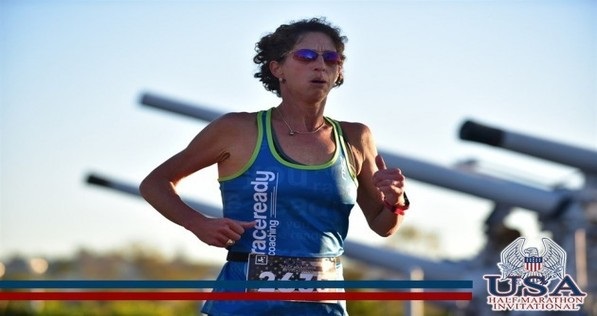5 Questions With Masters Runner Joanna Zeiger

Originally posted: January 27, 2016, Women’s Running
By: Courtney Johnson
Most runners would be happy to qualify for the Olympic Trials just once. For Joanna Zeiger, this will be her seventh time at the starting line. After running a 2:43:59 at the 2014 Shamrock Marathon to qualify, the 45-year-old is excited and grateful to race in Los Angeles on Feb. 13. Find out how this runner has been successful for decades.
Women’s Running: This is the seventh Olympic Trials in three sports you will be racing at. Which trial has been the most meaningful to you and why is it so important to you to represent your country?
Joanna Zeiger: When I qualified for the Olympics at the 2000 Triathlon Olympic trials, the day was extraordinarily special and completely a surprise. I look upon that day with fondness and rank it as one of my top-three sporting moments, along with winning the 2008 Ironman 70.3 World Championships and the 2000 Sydney Olympics, where I placed fourth.
Each trials has represented something memorable, whether it was in 1988 when I was only 18 and competing in my first trials or qualifying for the 2012 Olympic Trials Marathon as my answer to retiring from triathlon due to injuries from a bike accident I had in 2009.
Qualifying for the Olympic Trials has represented a carrot in so many different circumstances. As a youngster, I learned the value of goal setting, belief in yourself and hard work. Over the years, my motivation has changed from Olympic hopeful (in 2000-2008) to learning the ability of the human body to withstand the rigors of high-level training in the face of aging. The notion of achieving the time standard in the marathon in 2012 and 2016 gave me hope and a desire to defy the odds and get healthy in the face of chronic pain and injury.
Representing the U.S. in international competition is an honor and a privilege. I feel fortunate that I was able to do so in Olympic and World Championship situations. I have never felt more pride for my country that when I carried the American flag across the finish line in Sydney.
WR: Is there any tried-and-true training workout, nutritional philosophy or recovery technique that you have used through all your years of racing and training?
JZ: Massage has been a staple in my sporting life since I was introduced to the modality in college. Massage works for some people and not for others. For me, it has been my salvation both in times of injury and health.
I strength train year round. Endurance athletes notoriously avoid the gym. I will admit that I do not particularly enjoy strength training while I am doing it, but the benefits it has reaped in terms of promoting flexibility, muscle strength, and balance is indisputable.
WR: Do you have any crazy superstitions or anything you always do right before a big race?
JZ: My biggest superstition is that without consistency and hard work I won’t perform well, so I try to maintain a smart training schedule. I suppose that isn’t exactly what you are asking, but I don’t have any true superstitions.
WR: What’s the craziest thing you have experienced during training or racing?
JZ: The 2000 marathon trials were in Columbia, S.C. The day turned out very hot and humid. The pace was torrid from the start, with many competitors starting out beyond their capability, myself included. In addition, the water tables were only every 5K. The heat, pace, and lack of fluids led to some serious carnage on the course. At about mile 20, there was quite a steep hill, and I saw several women walking it. I was shocked that at that level, people would walk in a race.
It wasn’t until I ran the 2012 marathon trials that I fully understood why that happened. The women went out like they had nothing to lose. Then when their day was ostensibly over, they decided to walk it in rather drop out. In 2012, I was still dealing with my injuries and had just run a marathon 5 weeks prior in order to qualify. Needless to say, my body was not able to deal with running a marathon. I still ran the first 18 miles like I had nothing to lose though. Eventually, I started having some serious symptoms from my injury. I wanted to walk it in, just like those women had in 2000. But, I was just too ill to finish. I understood then that walking it in and finishing was preferable to not finishing at all.
[Note: Zeiger had a tough race last weekend at the Houston Half and ran/walked it in the last 5 miles to the finish line as well.]WR: What is your advice to that little girl just learning to tie her first pair of running shoes tightly that may have dreams of some day being an Olympian?
JZ: Part of the Olympic dream is understanding two things. There will always be setbacks and a true champion can push aside the “failures” and see them for what they are, which is a stepping stone to the next success. The second thing is that without passion and love for the sport, success cannot occur. I have been at a high level for so many years because I take joy in my ability to perform. I relish most aspects of training and racing, and I never take any of it for granted. No amount of talent will take hold if there is not passion to nurture it.
For the original story, please visit Women’s Running.
